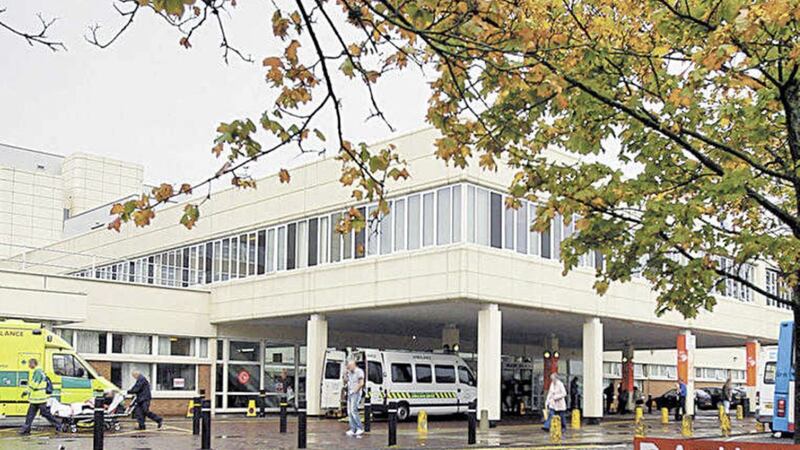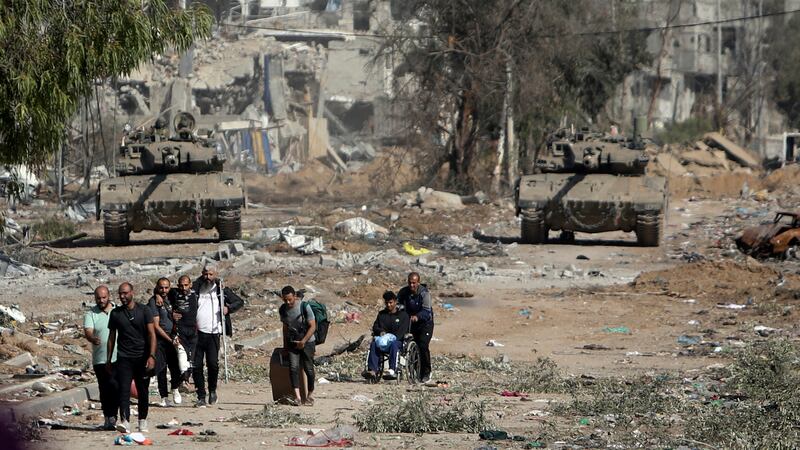STAFF shortages have left some nurses at Craigavon Area Hospital feeling burnt out and stressed, according to a new inspection report.
The Regulation and Quality Improvement Authority (RQIA) examined conditions in the emergency department and medical and surgical wards over four days in April as part of an unannounced visit.
And while the overall findings were positive, the inspectors observed caring and committed staff struggling to cope in some areas.
Olive Macleod, RQIA's chief executive, said: "RQIA's overall findings at Craigavon Area Hospital were good.
"In each area inspected we identified strong leadership, good governance and processes in place to provide good quality care to patients.
"While we noted a shortage in nursing staff numbers in the medical and surgical wards inspected, the Southern Health and Social Care Trust was working actively to address this deficit."
The inspection team included doctors, nurses, pharmacists and allied health professional peer reviewers and members of the public led by RQIA's healthcare inspectors.
They spoke to patients, relatives and staff, observed delivery and examined records to determine whether care was safe, effective and compassionate.
They also looked at how each ward was being led and managed.
At Four North, a 28-bed surgical ward, which can accommodate 34 patients during times of pressure, inspectors found staffing levels were poor with a heavy reliance on bank and agency staff.
Although additional nursing appointments had been agreed, the delay in recruitment was impacting on staff, leading to complaints of tiredness, burnout and stress.
Inspectors also noted difficulties in maintaining visual contact with higher risk patients and responding promptly to call bells, and delays in the preparation of and assistance with meals when staffing levels were low.
"We observed prompt staff responses to call bells and requests for assistance from patients when the ward had the agreed staffing levels.
"However, when the ward was short-staffed, we observed caring and committed staff struggling to meet patients' basic care needs," the report stated.
Other observations included the poor state of repair of the toilets.
At One South, a general medical ward, with gastro intestinal and rheumatology speciality nursing staffing levels were also below the recommended levels, but inspectors were told the trust had been actively working to address deficits.
Issues were highlighted around patient discharge and it was noted the availability of medical staff to complete discharge letters could cause a delay.
Meanwhile, it was found the trust had been proactive in the recruitment for the emergency department with 25 new nurses having taken up post within the past year.
Although a positive step, inspectors said it had presented challenges because 70 per cent of registered nurses within the ED had less than two years' experience.
It was also reported that the recruitment of paediatric nurses for the ED was proving difficult.
Attempts to minimise the symptoms of crowding through initiatives such as a revised triage process, escalation protocol and pathways for children were highlighted, and although some patients remained within the ED for longer than targeted time frames, inspectors said the quality of care they received was maintained to a high standard.
Mrs Macleod said: "In each area inspected we observed caring, sensitive and insightful staff working to maintain the dignity and privacy of those in their care.
"Patients also told us they were very satisfied with the standard of care and treatment they received.
"In the emergency department we observed senior nursing and medical staff directing and supporting departmental activities – and we commend this good practice.
"We also noted that the Southern Trust has been proactive in recruitment of nursing staff, and has a range of initiatives in place to minimise the symptoms of crowding in the ED.
"In the surgical ward we were told of an open and transparent culture, and staff were positive about the support they received from management.
"However, we noted the impact of staffing shortages, with a heavy reliance on bank and agency staff. While we observed good practice in relation to recording food and fluids, when short-staffed there were delays in preparation of meals and assistance provided to patients.
"The medical ward was bright and well presented, and staff told us that morale was good and they were happy working there.
"While we noted medical records were well organised, in a number of instances nursing care records did not fully demonstrate assessment, planning monitoring and evaluation of patient's needs.
"We also considered that supervision and coordination of meals required improvement."
Interim chief executive for the Southern Health and Social Care Trust, Francis Rice, said the report should reassure people of the high standard of care provided throughout Craigavon Area Hospital
He did, however, recognise staffing is an issue.
"Like other trusts, recruitment of nurses has been a real priority issue for the Southern area and we continue to invest significant time and effort into nursing recruitment," he said.
"We would like to reassure people that whilst at times we do have vacant posts, thanks to the dedication of our staff and through a variety of temporary and flexible working arrangements, we are able to maintain our rotas and ensure patient safety is not compromised."






